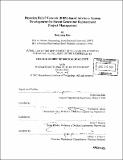Bayesian Belief Network (BBN)-based advisory system development for steam generator replacement project management
Author(s)
Kim, Dohyoung, 1970-
DownloadFull printable version (8.943Mb)
Alternative title
BBN-based advisory system development for steam generator replacement project management
Other Contributors
Massachusetts Institute of Technology. Dept. of Nuclear Engineering.
Advisor
Michael W. Golay.
Terms of use
Metadata
Show full item recordAbstract
The growing need for improved project management technique points to the usefulness of a knowledge-base advisory system to help project managers understand current and future project status and optimize decisions based upon the project performances. The work here demonstrates the framework of an advisory system with improved ability in project management. Based upon the literature survey and discussion with relevant experts, the Bayesian Belief Network (BBN) approach was selected to model the steam generator replacement proj ect management problem, where the situation holds inherently large uncertainty and complexities, since it has a superior ability to treat complexities, uncertainty management, systematic decision making, inference mechanism, knowledge representation and model modification for newly acquired knowledge. Two modes of advisory system have been constructed. As the first mode, the predictive mode has been developed, which can predict future project performance state probability distributions, assuming no intervening management action. The second mode is the advisory mode, which can identify the optimal action among alternatives based upon the expected net benefit values that are incorporating two important components: 1) expected immediate net benefits at post-action time, and 2) the expected long term benefit (or penalty) at scheduled project completion time. During the work, new indices for important variables have been newly developed for effective and efficient project status monitoring. With application of developed indices to the advisory system, the long term benefit (or penalty) found to be the most important factor in determining the optimal action by the project management during the decision (cont.) making process and was confirmed by the domain experts. As a result, the effort has been focused on incorporating the long term benefit (or penalty) concept in order to provide more reliable and accurate advice to the project managers. In addition, in order to facilitate the communication between the BBN models and the users, an interface program has been developed using the Visual Basic language.
Description
Thesis (Sc. D.)--Massachusetts Institute of Technology, Dept. of Nuclear Engineering, 2002. Includes bibliographical references (leaves 192-194).
Date issued
2002Department
Massachusetts Institute of Technology. Department of Nuclear Engineering; Massachusetts Institute of Technology. Department of Nuclear Science and EngineeringPublisher
Massachusetts Institute of Technology
Keywords
Nuclear Engineering.